A Guide to Egg-Based Diets
Posted on: August 9th 2018

- Overview
- The Trend of Egg-Based Diets
- Benefits of Eating Eggs
- An Overview of Popular Egg-Based Diets
- Important Considerations Before Starting an Egg-Based Diet
Dieting — it’s something we all dive into at one point or another. Whether it’s trying out a fad or crash diet we’ve seen in an ad, scouring the Internet for quick ways to banish belly fat, ordering a certified meal planning program in the mail or adjusting our lifestyles to include healthier choices, everyone has invested in at least one or two types of diets in the hopes of losing fat, looking our best or living life more confidently. Whether we’ve chosen safe and healthy diet plans that are genuinely beneficial to our bodies, however, is another story.
Here in America, we’re not strangers to the struggle of losing weight. In fact, roughly 160 million Americans struggle with obesity or being overweight — about 75 percent of all American men and 60 percent of all American women, totaling around two-thirds of the adult population. Unfortunately, America has a higher percentage of overweight citizens than any other country in the world. Despite our challenges, however, America doesn’t lack awareness of weight issues or a desire to become more healthy.
In a study by the Calorie Control Council on Americans’ health habits, researchers found more than 186 million American adults are weight-conscious — meaning they are physically self-aware and concerned with changing their eating, health habits and bodies for the better. Of that number, 54 percent would like to lose weight, and 28 percent aim to maintain or control their weight. We want to be slimmer, fitter, more energetic and more confident, but do we go about our weight loss efforts in the right way? Unfortunately, the answer is not always yes.
While we want to lose weight, decrease fat and feel better, we don’t always seek out the right information to help us do so — and we don’t always make the right choices when it comes to discipline, dieting and the kind of food we consume. When it comes to fad dieting and weight loss products, we tend to aim for the highest goals and accept the most extreme promises for weight loss, without considering whether these methods have natural roots or health benefits. That’s why 45 million Americans engage in diets every year and spend as much as $33 billion on weight-loss products, but 95 percent of fad dieters gain back what weight they do manage to lose. No wonder we’re discouraged with our progress!
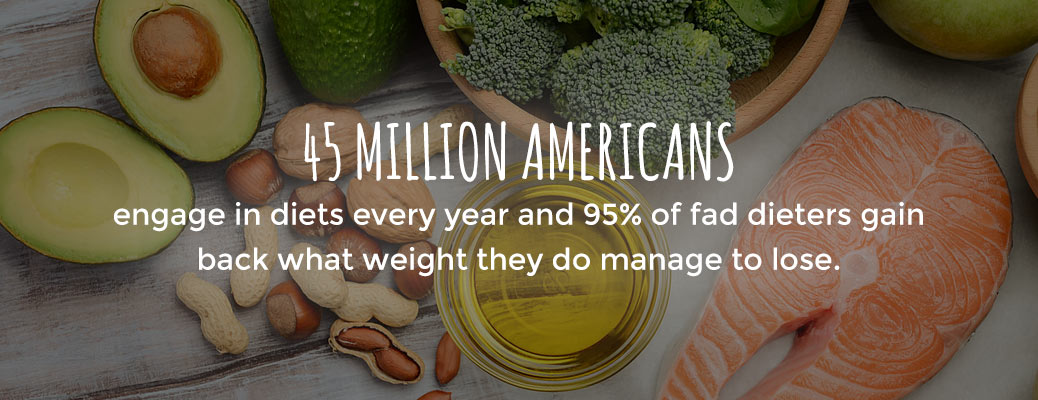
Rather than feeding into fad diets and purchasing products that promise more than they can give, it’s time we started paying attention to the healthy foods and habits within our reach — like incorporating beneficial foods into our regular diets or adjusting our eating habits to include more of the foods we need on a frequent basis.
Today, we’re here to explore a diet that’s a little different and focuses on a food we all eat and enjoy, but might never have noticed the benefits of. If you’re looking for information about the egg diet plan, you’ve come to the right place. From information on the best egg diets to questions like egg diet side effects, here’s our egg diet review.
The Trend of Egg-Based Diets
What is the egg diet plan?
An Internet-based eating trend, the egg diet has gained popularity as more people read about, attempt and share their weight-loss successes by eating more eggs. The egg diet began in 2010 with Jimmy Moore, an American food writer best-known for his blog “Livin’ La Vida Low Carb.” Partly inspired by the philosophy and fat-burning concepts of the keto diet — a diet plan that encourages high-fat, adequate-protein, low-carb daily consumption to encourage the body to burn fats for energy instead of carbohydrates — the egg diet plan was originally called the “egg-fest,” and Moore used it as a unique way to target his frustrating weight gain as a result of hyperinsulinemia, a condition in which his body produced excess amounts of insulin.
Moore — and his large, loyal following — soon realized the quick, drastic weight-loss results of this unorthodox eating routine, and his success led to the widespread development of a diet trend centering on the predominant consumption of eggs. Now, the Internet and the dieting world are brimming with a variety of egg-based diets recommending specific egg-eating guidelines and meal plans while offering an encouraging variety of egg diet success stories.
Among those sharing their egg diet results in public and online are celebrities and well-known figures like actor Adrien Brody and art collector and businessman Charles Saatchi, former husband of food personality Nigella Lawson. Brody used a diet based around sparse steamed vegetables and lean meat with eggs as a staple to lose 30 pounds in six weeks for a film role, while Saatchi adopted a more extreme egg diet of nine eggs a day and little else for nine months, during which he lost almost 70 pounds.
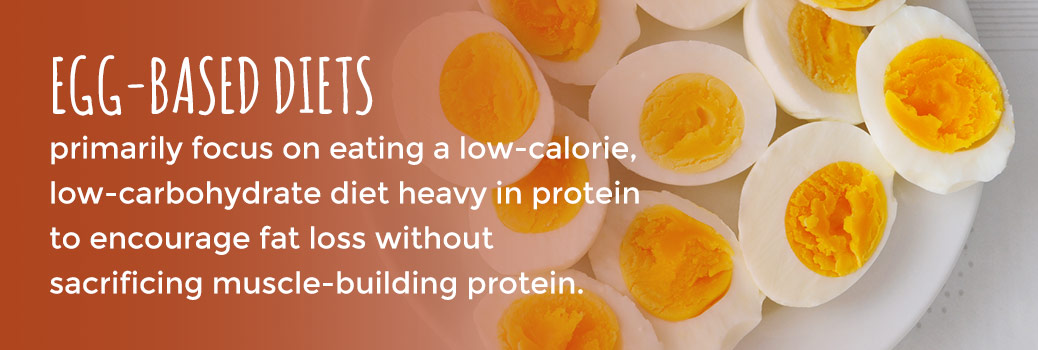
While each variation of the egg diet plan comes with unique conditions, guidelines and complementary foods, they all follow the same basic concept — eating a low-calorie, low-carbohydrate diet heavy in protein to encourage fat loss without sacrificing muscle-building protein. Eliminating all foods with high sugar or carbohydrate content, variations of the egg diet plan typically forego all beverages but water, begin every day with eggs and supplement that staple food with small portions of lean meat and vegetables at each subsequent meal. Some versions of the egg diet allow no food other than eggs, but none of them allow starchy carbohydrates, sweets and sugary foods. Eggs eaten during any variation of the egg diet plan are usually boiled, scrambled or poached without any oil or butter.
When it comes to any egg diet, the specifics of calories, servings and results depend on the age, sex, health, height, activity level and other personal factors of the dieter — but any diet should start with an educated perspective of the ingredients and habits involved.
Benefits of Eating Eggs
Whether you eat them on their own or as part of a balanced meal — and whether you make eggs part of your specific egg diet plan or just part of your regular daily diet — eggs themselves are rife with health benefits and nutritious components. Low in sodium, fat and saturated fat and high in both healthy proteins and key minerals and vitamins, eggs are a delicious, nutritious superfood beneficial for any age group — especially when you prepare them healthily, like boiling, and eat them without the addition of too much fat from cheese or butter.
What can incorporating eggs into your diet do for your body, and why are they so wholly nutritious? Here’s why eggs have such a positive impact on your body.
Rich in Nutrients
Did you know eggs are one of the most nutritious foods in the world? That’s because when fertilized, eggs are a self-contained growth environment for baby chickens, and they contain all the nutrients necessary to develop each chick from a single cell to a fully functioning organism. Unfertilized eggs become the perfect nutrition-packed snacks to nourish the human body with essential nutrients.
Both the egg white and the egg yolk contain rich, healthy components like vitamins and minerals, proteins, cholesterol, essential fatty acids and fat-soluble vitamins. All in one 70-calorie serving, a single egg contains:
- 13 percent of your daily recommended protein intake
- five grams of healthy fat
- 6 percent of your daily recommended dietary allowance (RDA) for vitamin A
- 5 percent of the RDA for folate
- 7 percent of the RDA for vitamin B5
- 9 percent of the RDA for vitamin B12
- 15 percent of the RDA for vitamin B2
- 9 percent of the RDA for phosphorus
- 22 percent of the RDA for selenium
- Decent doses of zinc, iron, folic acid, lecithin, calcium and vitamins K, E and B6
Eggs also have all nine amino acids, making them are an excellent source of almost every nutrient our bodies need. Containing higher levels of omega-3 fat, vitamin A and vitamin E, omega-3 enriched eggs and pasture-raised eggs are even more nutritious and beneficial to your health than standard white and brown eggs.
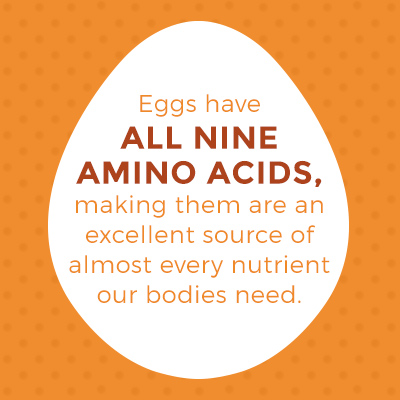
Improve and Preserve Eye Health
One of an egg’s most impressive properties is its ability to preserve eye health, prevent vision impairment with aging and even improve vision. How? Along with their varied store of other vitamins and minerals, eggs contain the nutrients zeaxanthin and lutein, which are powerful and essential antioxidants that accumulate in the retinas of the eyes and work to counteract degenerative eye issues like macular degeneration and cataracts. As we age, our natural levels of these components decrease, and our eyesight may begin to suffer, but consuming these nutrients can contribute to an increased store in our retinas, helping to reduce the risks of degeneration.
Eating as little as 1.3 egg yolks each day can increase your natural levels of lutein and zeaxanthin significantly. Eggs also contribute to good eye health by providing extra vitamin A, the lack of which is the leading cause of blindness in the world.
Increase HDL
In the past, doctors were slightly concerned about the levels of cholesterol eggs contained and whether consuming them regularly would raise your cholesterol levels, especially in those who already had high cholesterol. As it turns out, however, cholesterol in food has a much smaller effect on our blood cholesterol levels than we once thought — and even so, eggs contain and can increase the kind of cholesterol known as the “good” cholesterol.
Short for high-density lipoprotein, HDL is a beneficial form of cholesterol that has been linked with a lower risk of stroke, heart disease and other unpleasant health problems. Regularly eating eggs is an effective and healthy way to increase your HDL levels, improve your health and protect yourself against a variety of afflictions. Consuming as little as two eggs every day for six weeks can raise your HDL levels by 10 percent.
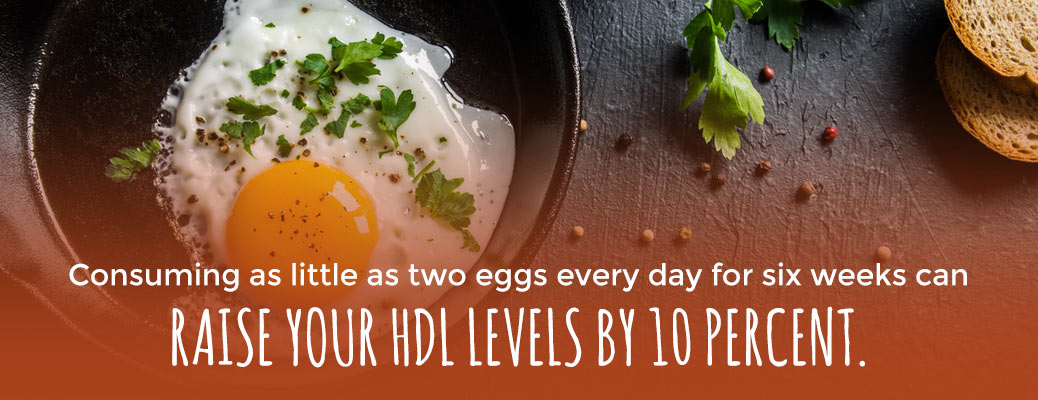
Transform Cholesterol
Eggs don’t just provide you with the good cholesterol — they also help you combat the bad kind.
It’s true eggs contain high levels of cholesterol. In fact, one egg contains as much as 212 mg, roughly two-thirds of your recommended 300 mg daily. But due to the essential levels of HDL in eggs and their amazing ability to transform unhealthy cholesterol into a less threatening form, eggs will do very little to raise blood cholesterol detrimentally. In fact, eggs have no increased effect on the cholesterol levels of 70 percent of people who eat them. On the contrary, eggs help lower the possible dangers of LDL — low-density lipoprotein — levels already present in your body by transforming your LDL stores from small, dense, dangerous particles to large, less threatening particles, lowering your risk of developing heart disease.
Boost Protein
As the primary building blocks of the human body, proteins are essential for building molecules and tissues that affect functionality and structure in every part of your body. Therefore, consuming the proper amount of protein is essential to healthy physical functions and brain functions, and the currently recommended dietary levels of daily protein consumption may even be too low. Containing six grams of protein and every essential amino acid, a single egg goes a long way in improving your health and increasing your protein levels to support muscle mass, optimize bone health and lower blood pressure.
Boost Brain Activity
Often associated with vitamin B, choline is an essential nutrient most people have never heard of — and certainly don’t get enough of. Used to build cell membranes, synthesize tissues and transport lipids, choline is crucial to producing signaling molecules in the brain and supporting healthy brain development — and a deficiency of this macronutrient can be damaging to liver function, muscle movement, nerve function, energy stores and anything else related to the brain. With more than 100 mg of this crucial nutrient, eggs are an excellent source of choline and a great way of ensuring your brain health.
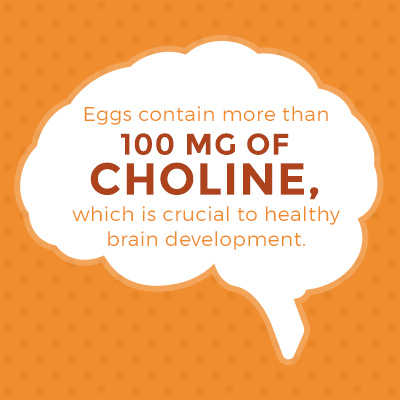
Support Pregnancy
Brain development is crucial in adults, but it’s even more critical for fetuses and infants to have adequate brain development to grow and function properly and develop healthy bodies and lives for the future. For this reason, the right supply of choline is especially essential for mothers to consume during the stages of pregnancy and breastfeeding. As a wholesome source of choline, eggs can help promote proper brain development and support strong, healthy babies in and out of the womb.
Prevent Osteoporosis and Strengthen Bones
As we age, our vitamin D levels can drop, leaving us with a dangerous deficiency that can be damaging to our bones. Because they contain high, helpful levels of wholesome vitamin D, eggs can contribute to preventing or reversing that problem, building vitamin D stores to strengthen, protect and reinforce bones — which will prevent conditions like osteoporosis and rickets. Depending on their method of production, some types of eggs — like organic, indoor or free-range — have higher levels of vitamin D, making them even more beneficial to your bones.
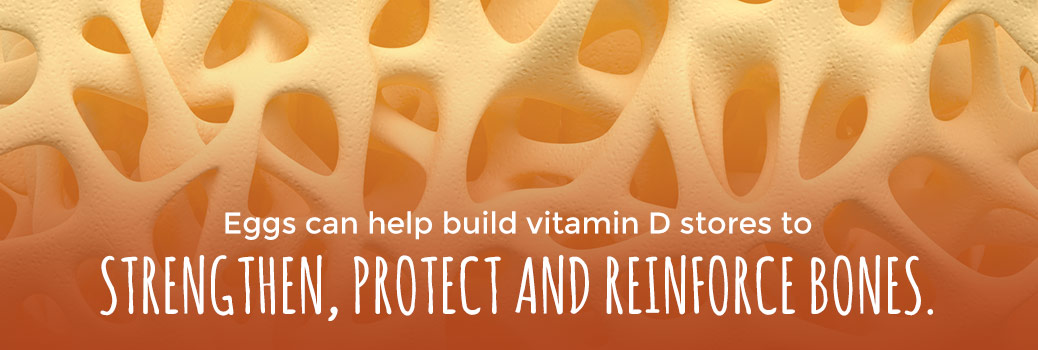
Reduce Heart Disease
While consuming a food high in natural cholesterol might seem like it would have just the opposite effect on your risk of heart disease, we’ve mentioned that the components in eggs work to raise your HDL levels — boosting the “good” cholesterol while transforming your LDL stores of the “bad” cholesterol into less threatening forms. Also, omega-3 enriched eggs and pastured eggs work to lower your levels of triglyceride — a potentially detrimental compound composed of glycerol and fatty acids. Combined, these incredibly helpful egg-induced factors contribute to lowering your risk of developing heart disease, strokes and other heart problems.
Can Help You Lose Weight
Because eggs contain high levels of the macronutrient protein, they are especially filling and rank higher in satiety, meaning they contribute to a more satisfying feeling of fullness that lasts longer. Because eggs are filling, eating them as snacks or consuming them early in the day will satisfy you for a longer time, naturally helping you consume fewer calories throughout the day and subsequently contributing to weight management and weight loss over a longer period. In fact, studies show replacing less healthy breakfast options like bagels with an egg not only caused people to take in fewer calories in a 36-hour period, but it contributed to significant weight loss over eight weeks.
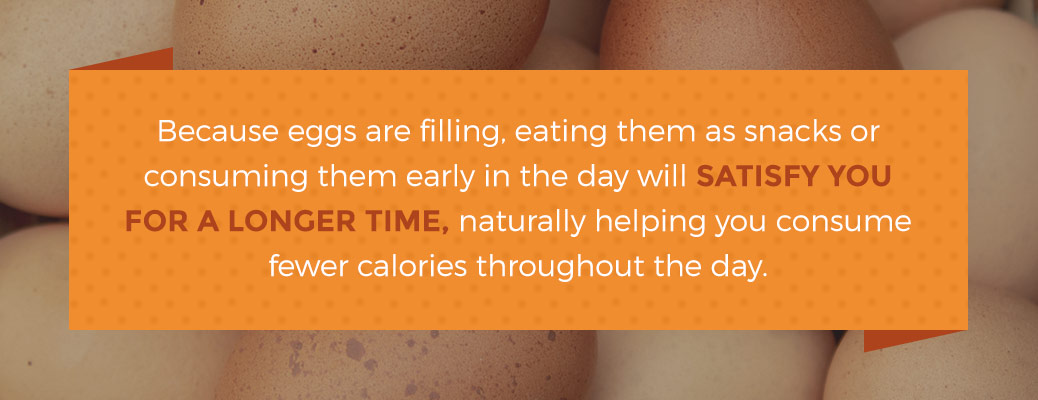
An Overview of Popular Egg-Based Diets
When it comes to the egg diet plan and the best egg diets to follow, you have a variety of options to choose from, each with a unique twist on what type of eggs to eat, times of day or frequency of egg eating, types of foods to eat along with eggs and other guidelines. Whether you’re thinking about following an egg diet plan or you’re just interested in learning more about the trend, here are some popular egg-based diets for you to peruse and pick from.
Traditional Egg Diet
This traditional version of the egg diet plan is typically called the egg diet, the egg-fest or the egg fast, and it takes direct inspiration from Jimmy Moore’s plan. Like all egg diet plans, it focuses on eggs as the primary source of protein and eliminates foods high in sugar and carbohydrates. In following this plan, you must eliminate starches like rice, potatoes and breads, as well as sugary foods like sweets or any other food high in sugar, for the duration of the plan. You also may not drink any high-calorie or sugary beverages — during this diet, it’s best to stick to zero-calorie drinks like water, black coffee or green tea. No snacks are allowed.
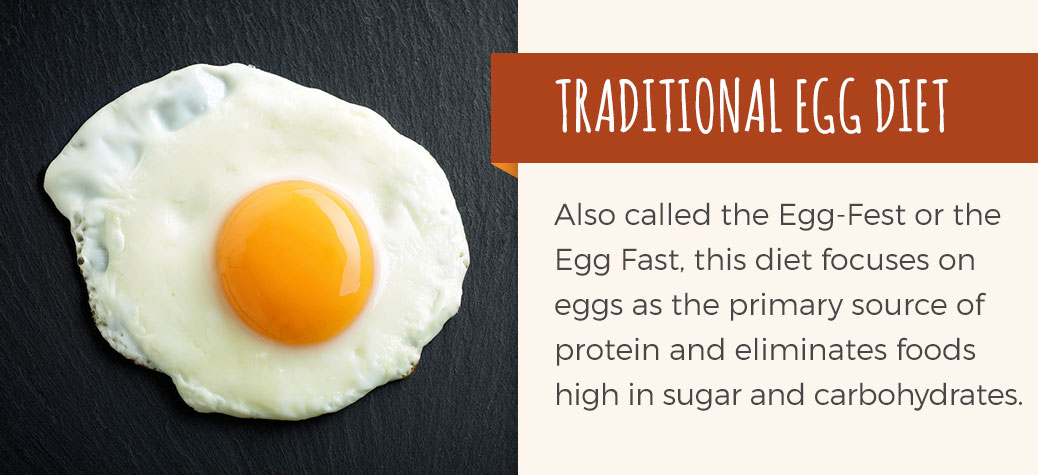
As the key source of protein, you can prepare eggs either boiled, scrambled or poached. This version of the diet allows other, regulated sources of protein, meaning you can eat lean meats — but no red meats — at certain times and in certain portions throughout the day. Vegetables low in carbohydrates — such as broccoli, kale, green salads and spinach — are permitted as desired, and some fruits are allowed as well, although only one to two servings per day.
Regarding popularity, this is the diet plan most celebrities and first-time egg diet enthusiasts choose to follow. Because it allows lean meats, fruits and vegetables, it qualifies as a balanced diet. The typical egg diet continues for three to five days, but you can extend it to a week or two depending on your preferences. No egg diet is intended for long-term use, however. Here’s what a typical day on the traditional egg diet might look like.
- Breakfast: Your morning meal will consist of two or more hard-boiled, poached or scrambled eggs. You may include a limited amount of fat by adding butter to your eggs, which helps preserve muscle mass while you lose weight. You should eat your eggs with either a low-carb vegetable, a lean protein like turkey or chicken or a healthy fruit like grapefruit.
- Lunch: For your midday meal, you will eat either another portion of eggs prepared to your liking, or a serving of a lean protein — like fish or chicken — along with a serving of low-carb vegetables, like a green salad. Do not exceed your serving sizes.
- Dinner: Your dinner will be similar to your lunch, consisting of protein and a vegetable. You may have a serving of eggs or another lean protein, as well as a low-carb portion of vegetables. After dinner, you should not eat anything else for three hours before bed, allowing your body to fast before breakfast.
This traditional version of the egg diet focuses on a lower intake of calories, which will help you lose weight, but naturally make you feel more hungry. The heavy incorporation of eggs into the diet, however, should help you feel fuller for longer to achieve the results you desire, and the balance of lean meats and vegetables will keep you healthy and balanced regarding nutrients.
Egg-and-Grapefruit Diet
This variation of the egg diet plan is very similar to the traditional egg diet, but with one important addition that helps fuel weight loss and rev your metabolism for the better. As with the traditional egg diet, the egg-and-grapefruit diet requires you to eat only eggs, lean proteins, green vegetables and some fruits, eliminating sugary drinks, sugary foods, sweets and high-carb foods like bread, pasta, rice and potatoes.
In addition to eating eggs as a protein staple, you will be incorporating a serving of grapefruit into every meal to accelerate your fat-burning capabilities. As the star of its own diet plan — the Hollywood diet, which has been popular among a plethora of celebrities since the 1930s — the grapefruit is a superfood high in acid and fat-burning enzymes, and combining its properties with the high-protein properties of eggs makes for an even more well-rounded diet plan that will re-work your body’s fat-burning capabilities.
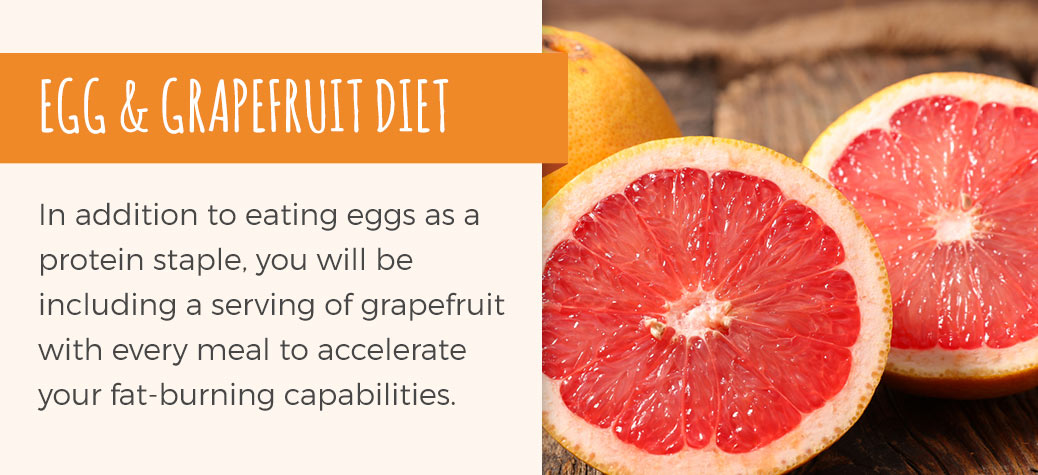
Just like with the traditional egg diet, you will consume eggs or a lean protein and a serving of green vegetables at every meal, but you will also add half a grapefruit. Here’s what each day will look like on the egg-and-grapefruit diet.
- Breakfast: To start off your day, eat two eggs in the preparation style you prefer — boiled, scrambled or poached — along with half a grapefruit to jump-start your metabolism.
- Lunch: Your midday meal will consist of one lean protein — like fish, turkey or chicken — as well as a green vegetable such as spinach and half a grapefruit to power you through the day.
- Dinner: For your evening meal, you will choose a lean meat or eggs as your protein serving and complete it with half a grapefruit to complete your day.
Not only will this diet help your metabolism by offering increased protein, but it provides an extra boost with the healthy addition of grapefruit, which balances your intake and keeps you refreshed and satisfied.
Boiled Egg Diet
Focusing strictly on a specific preparation of eggs, the boiled egg diet is a bit more varied regarding other foods you will consume in addition to the eggs. Allowing a variety of lean meats, fruits, low-carb vegetables and fats like cheese, this version of the egg diet plan focuses on the consumption of healthy proteins and fats and the elimination of carb-heavy foods with a bit less strictness.
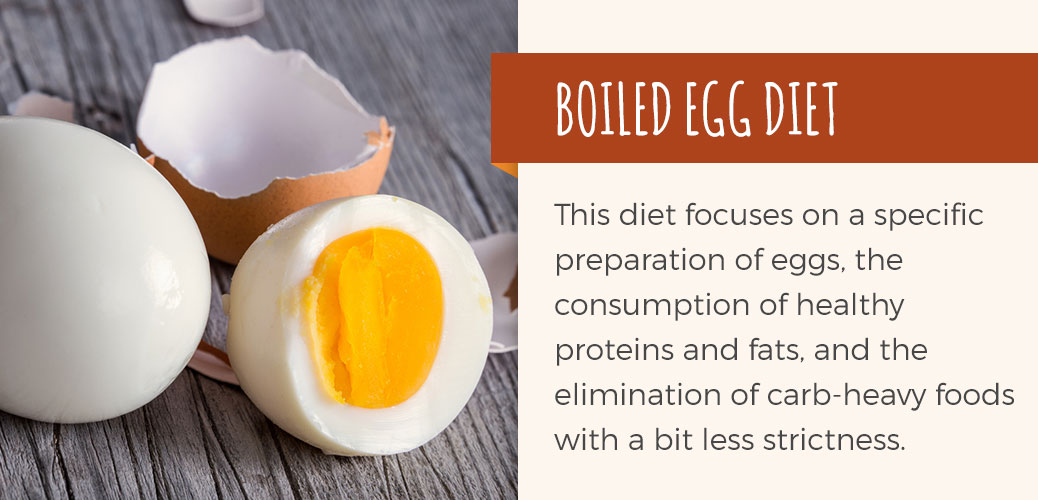
For the boiled egg diet, you must cut out high-carb foods like bread, pasta, potatoes and rice, sugary drinks like soda, alcohol and juice, junk food or processed food, foods high in salt and sauces and dressings high in carbs. The boiled egg diet allows low-carb sweeteners in moderation. These are the specific guidelines you should follow during the boiled egg diet.
- Eat at least six eggs a day — or two for each meal — unless you substitute another lean protein for lunch or dinner.
- Eat meals at least three hours — but no more than five hours — apart.
- Schedule your mealtimes and always consume at least one egg when it’s time to eat, even if you’re not hungry.
- Eat one tablespoon of healthy fat for each egg you consume — this can consist of butter or one ounce of cheese.
Here is what your meal plan might look like each day on the boiled egg diet, although the specifics of meals may vary.
- Breakfast: Make sure to start your day with eggs within 30 minutes of waking up. Your meal will consist of at least two boiled eggs and one whole citrus fruit of your choosing. Pair each egg with a one-ounce serving of low-fat cheese or butter.
- Lunch: For the middle of your day, pair two boiled eggs or a lean meat — like fish or chicken — with a low-carb vegetable or salad and one whole, healthy fruit like an apple or citrus. If you choose eggs, remember to consume one ounce of healthy fat per egg.
- Dinner: Your last meal of the day should consist of a healthy serving of steamed vegetables or a full salad paired with a lean protein — like grilled fish, turkey or chicken — or two boiled eggs. Again, pair your eggs with one ounce of healthy fat per egg. You should eat dinner no later than three hours before bed and eat nothing else until morning.
With multiple options for each meal and the types of meats, vegetables and fats you can consume, the boiled egg diet should keep you satisfied as well as help your weight-loss efforts.
Extreme Egg-Only Diet
This strict egg diet plan consists entirely of eggs, and you should follow it no more than three to five days to ensure you don’t consume too few nutrients over an extended period. You can incorporate this diet for a few days to shed a few pounds, increase your protein intake or jumpstart your metabolism, but it’s not safe for long-term use because it lacks the well-rounded balance of vitamins and nutrients you need to sustain good health.
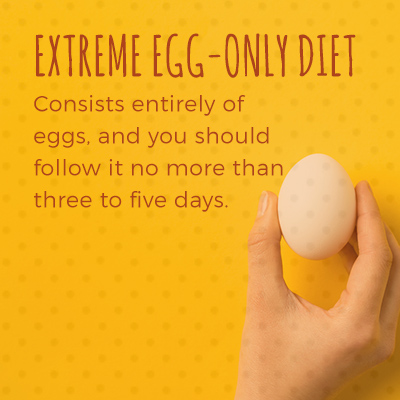
During this diet plan, you may not consume carbohydrates, sugars, fruits, vegetables or any lean protein other than eggs. You must drink at least eight cups of water a day during the diet to ensure you stay hydrated and keep your body functioning properly. Each meal will consist of at least two eggs prepared in your preferred style as well as a glass of water, and you should continue to drink water between meals. To ensure you receive the proper nutrition, use this egg diet plan only as a brief fast to amp your metabolism.
Atkins Diet
The Atkins Diet existed before any egg diet plans, but because it follows the same general idea and is well-established, you may follow this diet plan as part of your egg diet efforts and be sure to incorporate plenty of eggs as staple proteins.
Originating in 1972 as the invention of physician Robert C. Atkins, the Atkins diet operates based on low-carbohydrate, high-protein consumption for weight loss and health improvement — without calorie-counting. Studies of the diet reveal it increases HDL without raising LDL and leads to effective weight loss. In this diet plan, the type of foods you eat and avoid are more important than the amounts you consume.
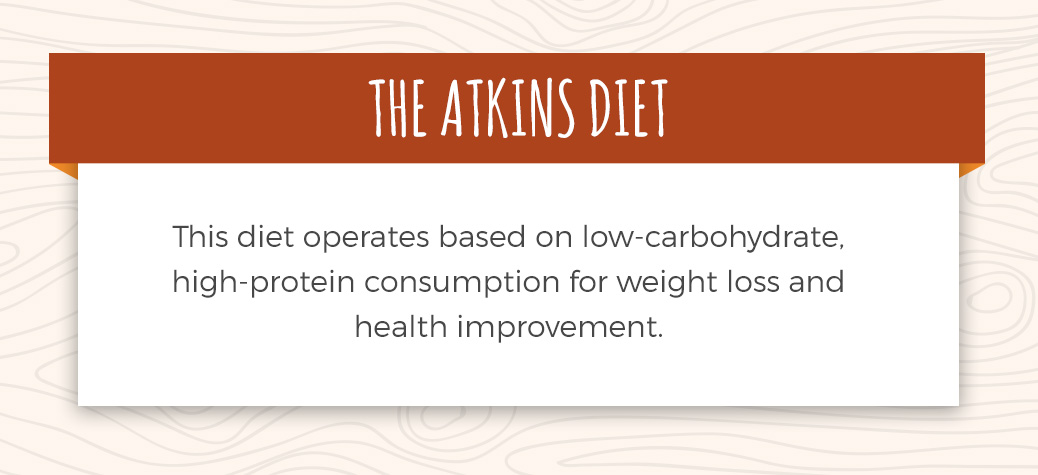
The Atkins Diet requires you to cut out the following foods.
- Sugars: Candy, cake, ice cream, soda, etc.
- Vegetable oils: Corn oil, soybean oil, canola oil and more
- Grains: Wheat, rye, spelt, barley and rice, meaning no breads, pastas or other grainy foods
- Trans fats: Any processed foods
- Diet products: Anything claiming a “low-fat” label, meaning it’s usually high in sugar content
- Starches: Potatoes and sweet potatoes
- High-carb fruits and vegetables: Carrots, corn, turnips, bananas, oranges, apples, grapes, pears and more
- Legumes: Beans, lentils and chickpeas
Instead of these foods, focusing on including healthy, protein-heavy choices such as the following.
- Healthy fats: Coconut oil, avocado oil, extra-virgin olive oil and avocados
- Meats: Chicken, pork, beef, lamb, bacon and more
- Full-fat dairy: Cheese, cream, cream cheese, butter, whole milk and full-fat yogurt
- Low-carb vegetables: Spinach, broccoli, kale, asparagus and other greens
- Fatty seafood: Trout, sardines, salmon and more
- Nuts and seeds: Walnuts, sunflower seeds, almonds, macadamia nuts and more
- Eggs: Preferably omega-3 enriched or pastured
The Atkins Diet operates in four phases, in which you adjust your carb and protein content to train your body for weight loss. They are as follows.
- Phase 1, or induction: For two weeks, all three of your daily meals should consist of low-carb vegetables like greens, high-fat choices like butter, olive oil or avocado and high-protein choices like eggs or meats. Eat under 20 grams of carbs each day to kick-start your metabolism for losing weight.
- Phase 2, or balancing: Your daily meals should still consist of the three staples of low-carb vegetables, protein and fat, but you may also begin to add other elements like nuts and fruits.
- Phase 3, or fine-tuning: As your weight loss continues and you get closer to your goal weight, you may begin to add back more carbohydrates to slow down your weight loss.
- Phase 4, or maintenance: As you ease back into your regular eating habits, gradually add back a moderate amount of healthy carbs to sustain your better metabolism.
As you can see, protein is an extremely important part of the Atkins Diet, and you can combine this plan with an egg diet plan by using eggs as your main source of protein during the Atkins Diet and complementing them with low-carb vegetables and healthy fats to see both the weight-loss benefits of the diet and the health benefits of eating eggs.
Important Considerations Before Starting an Egg-Based Diet
Before embarking on an egg diet plan — as with any diet plan — it’s essential to make a few considerations. Here’s what to think about before beginning your diet.
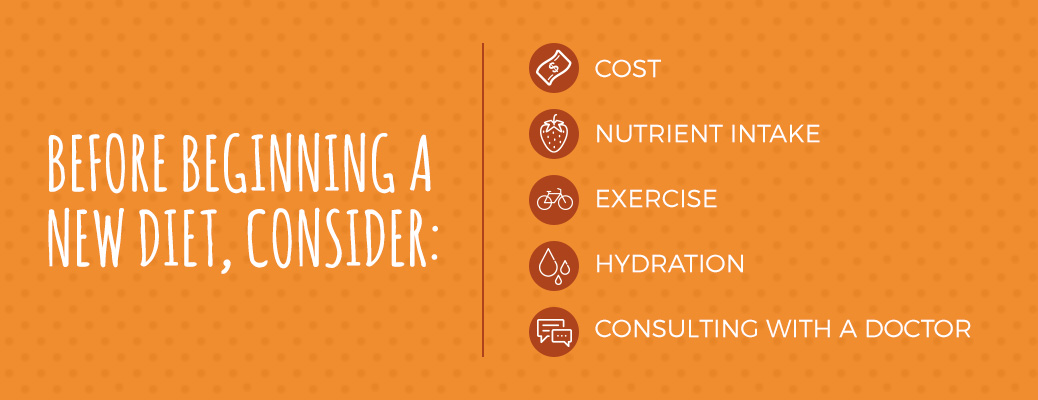
- Cost: Before beginning any diet, project the potential cost of stocking up on and maintaining a supply of the foods you need for the duration of your diet. The egg diet plan is a convenient, cost-effective diet to choose because eggs are inexpensive and the diet’s supplementary foods don’t require any unusual or costly ingredients.
- Nutrient intake: During any diet, you still need to make sure you’re consuming the proper amount of nutrients and vitamins to remain healthy, even if you’re cutting back on a specific food group like carbs to lose weight. If you have low blood sugar or want to make sure you receive the proper nutrient intake, choose one of the egg diet plans that incorporates a variety of foods, and make sure your diet is only temporary.
- Exercise: When it comes to weight loss results and a healthier body, exercise complements and improves any diet. When you plan your physical activity, however, just make sure your meals are providing you with the right amount of energy — don’t overexert yourself.
- Hydration: Because diets can tend to cause a rapid loss of water weight in the beginning stages, it’s important to stay well-hydrated with plenty of water throughout your diet, especially between meals and after exercising.
- Consulting with a doctor: Everyone is different, and every diet will provide different results for different individuals. If you have specific questions or concerns about starting a diet, consult with your doctor beforehand to be safe.
Stock Your Egg Supply With Sauder’s Eggs

Whether you’re following an egg diet plan or just incorporating more eggs into your daily diet to reap the health benefits, no one offers fresher, more wholesome or healthier eggs than Sauder’s Eggs. With a history of producing and providing the highest-quality products for more than 80 years, our family-owned and -operated company is proud to bring you the best eggs from the freshest farm sources. Choose from a healthy, wholesome variety of egg options — from classic white or brown eggs to cage-free, organic, omega-3 enriched, free-range and pastured eggs for every occasion. Start your healthier egg-eating journey today by finding your favorite kind of Sauder’s Eggs in a store near you.
